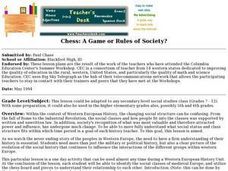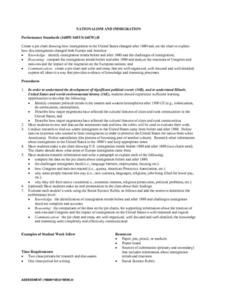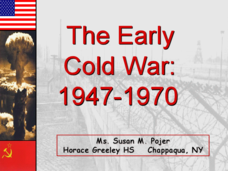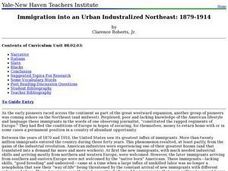Curated OER
Views of the American West: True or False?
Students explain that a landscape painting may or may not accurately represent a specific place. They identify techniques that create the illusion of three-dimensional space on a flat surface.
Curated OER
Chess: A Game or Rules of Society
Students identify the social classes of medieval Europe, and utilize the chess board and pieces to explain their relationship to each other.
Curated OER
Nationalism and Immigration
High schoolers use the internet to research how immigration patterns changed after 1880. Using this information, they create a pie chart to organize it effectively and discuss how immigration changed Europe and the United States. They...
Cave Creek Unified School District
Crusades and Culture in the Middle Ages
The Crusades sounds like a glamorous time period in the Middle Ages full of glory—but was it? Scholars find and review the truth of the Crusades' influence on the world through the resource. The study guides, separated individually by...
AGSSS
World Regions
Help your learners to visualize where historical events have taken place around the globe with a map that details the major regions of the seven continents.
Curated OER
Identifying and Using Parallelism and Balance in Literature
Analyze the use of balanced sentences and parallelism in a narrative. Included in this resource is a narrative about serving as a Peace Corps volunteer in Kazakhstan titled, "The Train Ride Home". Middle and high schoolers review...
Smithsonian Institution
Cold War
The Cold War was not necessarily always cold in temperature, but the relationship between the United States and the Soviet Union sure was frigid! Scholars read various passages, view exhibition graphics, and observe an artifact from the...
Curated OER
The Early Cold War: 1947-1970
With a combination of images, maps, and valuable information, this presentation is a strong resource for a history class that is coming out of a WWII unit and into a Cold War unit. Some points are outlined for students, while others are...
The New York Times
Kiev in Chaos: Teaching About the Crisis in Ukraine
Provide a historical context for the political unrest between Russia and Ukraine that began in late 2013. Learners review their prior knowledge and chronicle new understandings with a KWL chart, watch a video explaining the Ukrainian...
Curated OER
Lesson: Urs Fischer: Reviving the Past Art Movements
Seven major abstract art movements are analyzed by learners in groups. Each group analyzes various works by determining which work belongs to which movement. They then read Flatland, engage in an art and literary analysis discussion,...
Curated OER
The Geography of the United States
Full of bright maps and interesting information, this presentation details U.S. Geography. Slides include basic facts about size, regions, topography, and demographics, as well as fascinating trivia about the United States, including...
Curated OER
Taming of the Shrew, Act 4.3, Study Questions
Shakespeare can be a challenge to the most skilled high school readers. This selection of short answer questions helps increase understanding of the character, Katherine, by addressing dialogue, tone of voice, making inferences, and...
Curated OER
Which Foods Come From Rainforests?
A very interesting and colorful presentation on the original sources of food is here for you. Learners discover where foods such as bananas, asparagus, potatoes, and oranges come from. They come from rainforests located all over the world!
It's About Time
Electricity and Your Community
Young scientists read and interpret a data table about energy generation around the world. Next, they use the Internet to investigate energy generation in their own state, and, finally, pupils read a passage and answer questions about it.
Roy Rosenzweig Center for History and New Media
Immigration: Why Come to the United States?
Don't limit your curriculum to texts! Young historians listen to a song, read an interview, and examine a cartoon as they explore motivations for immigrating to the US in the late 19th and early 20th centuries.
Curated OER
Women and Korean Literature
Students read a text about women in Korean and their role in Korean literature. In this Korean literature lesson plan, students read a text by Helen Koh to learn about women writers in Korea.
Curated OER
Leonardo da Vinci: Creative Genius
Students discuss how Leonardo Da Vinci reflected the spirit of the Renaissance. They examine his achivements and explain the significance of his notebooks. They write essays on what constitutes a "rRenaissance man."
Curated OER
The Importance of Being Flexible and Open-minded as a Visitor to Another Culture: Lesson 2 For "The Train Ride Home"
Students examine the advantages of being flexible when visiting or living in a different culture. They read and discuss a first-hand account by a Peace Corps volunteer in Kazakhstan, and write a letter from the point of view of a...
Foreign Policy Research Institute
Islamic Civilization in Spain
There may be elements of this lesson that are useful for a unit on Islamic influence in Spain; however, there is little alignment between the learning objectives and the final product --a ten page report. For example, some of the...
Curated OER
Sleuthing A Writer's Skills
Students read The Train Ride Home by Robin Solomon. For this literature response lesson, students will inspect the writing of Solomon to determine how she established a certain tone through her word choice and paragraph structure....
San Bernardino Co. Supt. of Schools
Was Julius Caesar a Good Leader for Rome?
Learners consider the various perspectives that different groups in Roman society may have had for Julius Caesar, such as Roman soldiers, senators, the working class, and slaves. The primary activity involves a reading of Caesar's...
Curated OER
Immigration into an Urban Industralized Northeast: 1879-1914
Learners study how three ethnic groups were introduced to urban, industrialize, northern cities. They examine how these groups were greeted and accepted be the 'native born' Americans and how successful they were in assimilating with...
Curated OER
The Odds of Dying During a Plague
Sixth graders explore plagues in the middle ages. In this social studies lesson, 6th graders examine the impact of deadly plagues on past societies and how the governments were forced to make drastic changes in response to the plagues
Curated OER
The Role Of NATO
Young scholars examine the role of the North Atlantic Treaty Organization (NATO). For this NATO lesson, students research the Truman Doctrine, the Marshall Plan, Winston Churchill's "Iron Curtain" speech, and the Berlin airlift and how...
Other popular searches
- Western Europe Geography
- Western Europe Maps
- Western Europe Outline Map
- Western European Countries
- Western European History
- Western Europe Bell Work
- Map of Western Europe
- Western Europe 1400
- Maps of Western Europe
- Western European Culture
- Map Skills, Western Europe
- Western Europe Bellwork

























